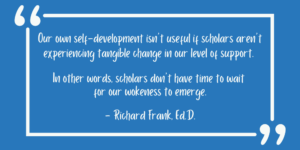It’s easy to imagine that, as educators, our jobs exist in a bubble. However, we’ve all experienced circumstances in our lives outside of school that impact our performance during the school day in some capacity. This is true for our scholars as well; for scholars of color, the intersectional nature of racism is such that their experiences outside of school will be reflected and perhaps magnified during their school day. As educators, it’s our duty to be vigilant and proactive in removing any racist barriers that prevent scholars from actively engaging in the education they deserve.
First, it is necessary to understand that racism is bigger than specific individuals and their actions. Racism is a system. This means that when looking at inequities between racial groups, it’s critical to identify policies, practices, and procedures that have created, perpetuated, and reinforced these inequities.
As educators, we have a choice. We can either be complicit in the perpetuation of inequities, or we can do something about it. Taking an anti-racist approach is recognizing that being “not racist” is not sufficient. The passivity of being “not racist” isn’t strong enough to disrupt and replace systems of oppression. Being “anti-racist” requires active resistance to and dismantling of systems of racism.
I get it. Taking action to disrupt and replace obstacles that scholars face outside of school seems overwhelming and beyond our scope of control. As educators, we may not feel we have the means, connections, or access to address the systemic challenges with which our scholars grapple when they leave the classroom or school. However, it is not only within our control but also our responsibility to ensure that no barriers inhibiting the success of scholars exist within the parameters of the school day. As the educator, we are the determining factor in a scholar’s success in the classroom. With the position and agency to influence the educational environment and experience, teachers and school leaders must take action to center, uplift, and empower their scholars of color. The only other option is choosing to be complicit in the perpetuation of the unjust, oppressive conditions reflective of those present daily outside of school.
So how do we take an anti-racist approach to address classroom and school-wide inequities?
The work begins with identifying and earmarking our own beliefs, mindsets, and biases about education, students, families, and the communities from which they come. Further, it involves working to grow our awareness and understanding of the ways in which our scholars’ school day may embody the same oppressive societal conditions they experience outside of school. The key is being keenly aware that none of this identification and introspection matters without action.
Our own self-development isn’t useful if scholars aren’t experiencing tangible change in our level of support. In other words, scholars don’t have time to wait for our wokeness to emerge.
In order to fulfill the responsibility of ensuring every child has equal access to and opportunity for academic success, we must have the moral courage to act in ways that will realize transformative change in our school community.
All teachers and school leaders have the power to act by taking risks to:
Constantly question and evaluate inequities based on race.
- Examine classroom(s) through a racial equity lens.
- Who is on task, engaged, thriving? Who is sitting where? Who is raising their hand? Who is being called on, ignored, or yelled at?
- Break down classroom/school-wide data by racial groups.
- What disproportionalities exist in classroom/school data (e.g., discipline; formative assessments and test scores; enrollment in gifted and talented, honors, and/or AP courses; graduation rates)?
- Analyze racial makeup of school staff.
- Do scholars of color see themselves reflected in their teachers? School leadership?
- Scrutinize curricula to ensure cultural inclusivity and relevance.
- Are the histories, stories, and voices of people of color centered, honored, and uplifted throughout the curricula?
- Analyze school environment for identity representation.
- Do scholars of color see themselves, their families, their cultures, and/or experiences reflected throughout the school environment?
Deconstruct the personal and structural behaviors, systems, and policies that lead to inequities.
- Raise awareness of personal biases and stereotypes through critical self-reflection after negative and/or disempowering thoughts or making statements about scholars of color, their families, or the communities from which they come.
- Bravely speak up and address any demonstration of biases, microaggressions, deficit-based language, and/or overt and implied racist remarks from colleagues and/or scholars..
- Disrupt systems of tracking that lead to segregation of scholars of color into static remedial placements.
- Challenge and expose punitive disciplinary policies and practices as harmful and counterproductive.These policies are disproportionately applied to scholars of color, and they mirror, perpetuate, and maintain the boundaries of engrained societal racial hierarchies.
Build replacements that create a more equitable educational experience and outcome for every scholar.
- Create equity-oriented objectives and goals in the areas of academic performance, discipline, staffing, and resource allocation.
- Establish authentic scholar-school-family-community partnerships where youth of color, families, school staff, and community partners work together to plan, implement, and continuously improve strategies and programs.
- Replace punitive discipline approaches with empathic and restorative approaches that are fair, just, and equitable.
- Promote rigorous, relevant, and inclusive curricula and instruction that sets high standards and expectations for all scholars and supports in the development of academic, social, and emotional skills to achieve their goals, contribute to, and succeed within and beyond their community.
- Use frequent formative assessments, examine gaps, adjust instruction, and provide additional support necessary to meet the specific demands of every scholar.
- Actively build a pipeline of teachers of color by cultivating relationships with deans and professors, and personally go speak with college students.
While these tenets may depart from established modes of thinking surrounding the school environment in which we work, it’s crucial to remember that every day matters for each of our scholars. These action items are urgent: the quicker we can create an anti-racist learning environment for every single student in our classroom, the more effective we’ll be in developing strong, engaged, and motivated scholars who see school as a place of safety and opportunity.
by Richard Frank, Ed.D.
Check out CT3 Education programs such as No-Nonsense Nurturer, Real Time Teacher Coaching, and Real Time Leadership Coaching to find out more about Professional Development for Teachers and Leaders, classroom management strategies, and building relationships with students and their families, and properly addressing important issues in the classroom and school.
Category: Anti-Racism, Change



